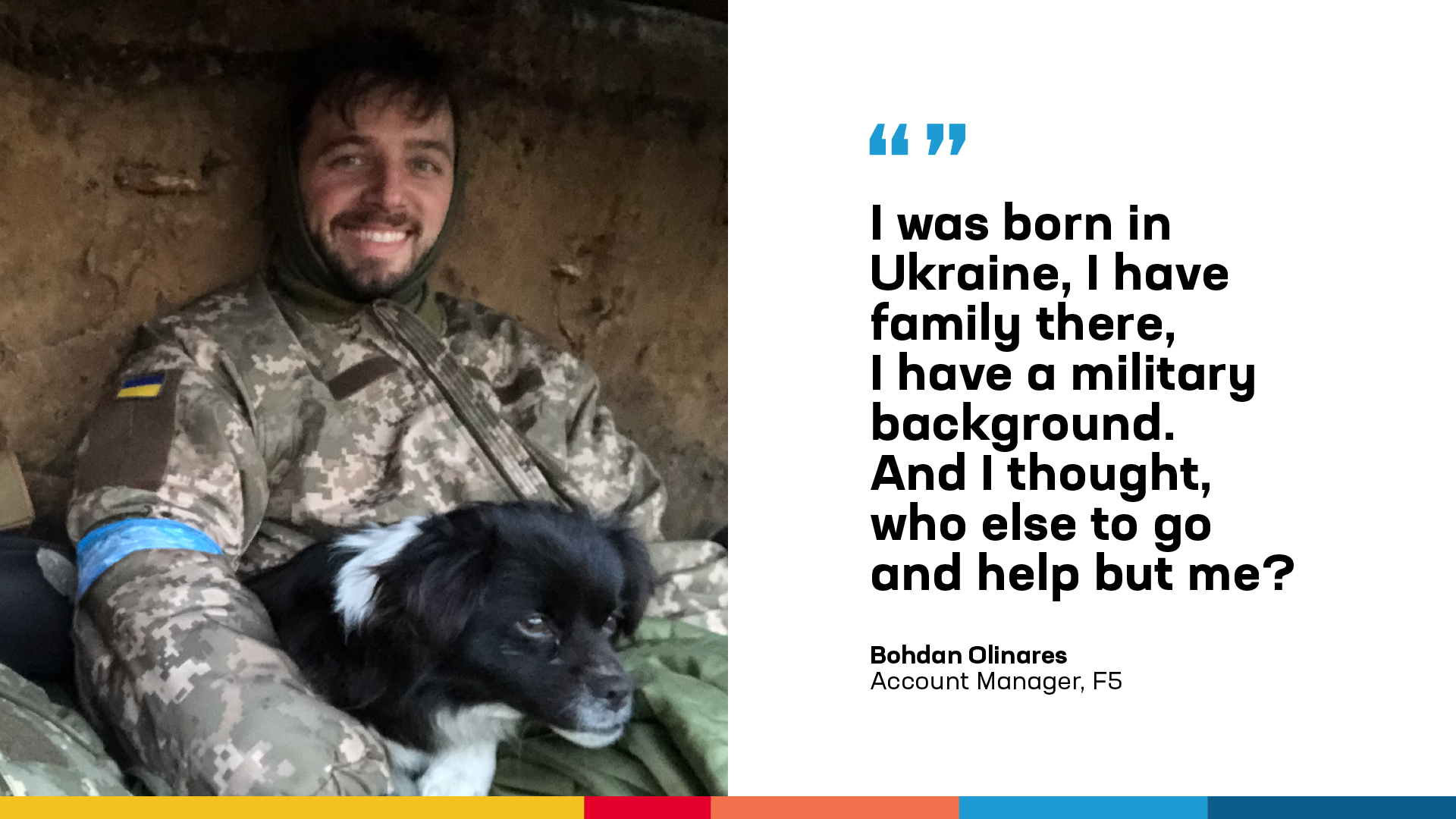F5 Employee Helps Defend Ukrainian Homeland
When Russia invaded Ukraine in February 2022, F5 employee Bohdan Olinares immediately considered what he could do to help. “I was born in Ukraine, I have family there, I have a military background,” says the former U.S. Marine. “And I thought, who else to go and help but me?”
As Olinares contemplated leaving his job at F5, he happened to watch a video of three Ukrainian teenagers throwing a Molotov cocktail at a Russian tank—and it cemented his decision. “It broke my heart that these teenagers were out there risking their lives with no military training,” he says. “I thought if I could train civilians and give them more confidence on the battlefield, this was something I had to do.”
The F5 human-first spirit in action
In the days that followed, Olinares, an account manager on F5’s federal customer sales team in Washington, D.C., firmed up his plans and bought an airline ticket—telling his supervisor of his decision. To his surprise, rather than trying to talk him out of it, Olinares’ supervisors told him F5 would support him and would work quickly to figure out the details. The very next day, they offered Olinares an extended leave of absence as well as three months of commission after he exhausted his paid leave. “It was incredible,” he says. “Everyone from my director to my VP to my colleagues jumped into action to help me. It’s not what I was expecting. I was expecting them to say, ‘I think you’re crazy for doing this.’”
Even more surprising, Olinares soon got a phone call from F5 President and CEO François Locoh-Donou telling him there’d be a job for him when he returned—no matter how long he stayed away. Locoh-Donou talked with Olinares for about 15 to 20 minutes, asking him about his trip and wishing him well on his journey. “It was a very personal and candid conversation,” Olinares says. “He shared his feelings, what he thought of the situation, how he could place himself in my shoes because he’s also a foreigner who cares deeply about his homeland. It was very touching.”
Before his departure, Olinares’ team at F5 threw him a going-away party to show their support. They also took up a collection to help him purchase clothing, tools, and other gear he needed to enter a combat zone. Olinares told his supervisor he didn’t want his colleagues to go out of their way to help him. But he was told F5ers were eager to help, and this was their way of contributing. “All of this showed me that being human first isn’t just corporate lingo,” Olinares says. “The support I got from everyone at F5 was overwhelming, and it made my transition to Ukraine that much easier.”
Serving in defense of Ukraine
Once Olinares arrived in Ukraine, friends helped him secure the connections he needed. He eventually joined the Special Forces section of Ukraine’s Territorial Defense Forces, where he developed a training program to prepare Ukrainian civilians for battle, some of whom had never held a gun.
Olinares says F5’s reputation as a human-first company followed him all the way to Ukraine. “One of the first things that people in Ukraine asked was, ‘What did you do about work?’ And I was able to say, ‘This company F5 that I work for cares about what’s happening here, and they back me 100 percent.’ So, I’d love to think that even in Ukraine, F5 is seen as a human-first company.”
In the end, Olinares spent six months in Ukraine. By then, his unit had more than tripled in size and was slated to receive three months of formal military training at a newly created facility. “They now had more than enough people willing to fight, and with the three-month gap, I thought it was a good time to head home.”
Coming together during a time of need
Now back at F5, Olinares continues to raise awareness about the war and the need for ongoing support from the West. He says he wants people to understand the difficult situation Ukrainians are facing and their strong desire to maintain their independence. “When you think about taxpayer dollars going over there, try to think of the future, try to think of the people and what the war is doing to them,” he says.
Olinares says his biggest takeaway from his experience in Ukraine is that people still come together during times of need. “I know the world can feel so divided and that we think we’re far apart,” he says. “But I believe people are drawn to selfless acts and that every selfless act serves as a multiplier. I’ve seen people come together from all sorts of backgrounds to help the people of Ukraine. This whole experience has really expanded my faith in humanity.”

